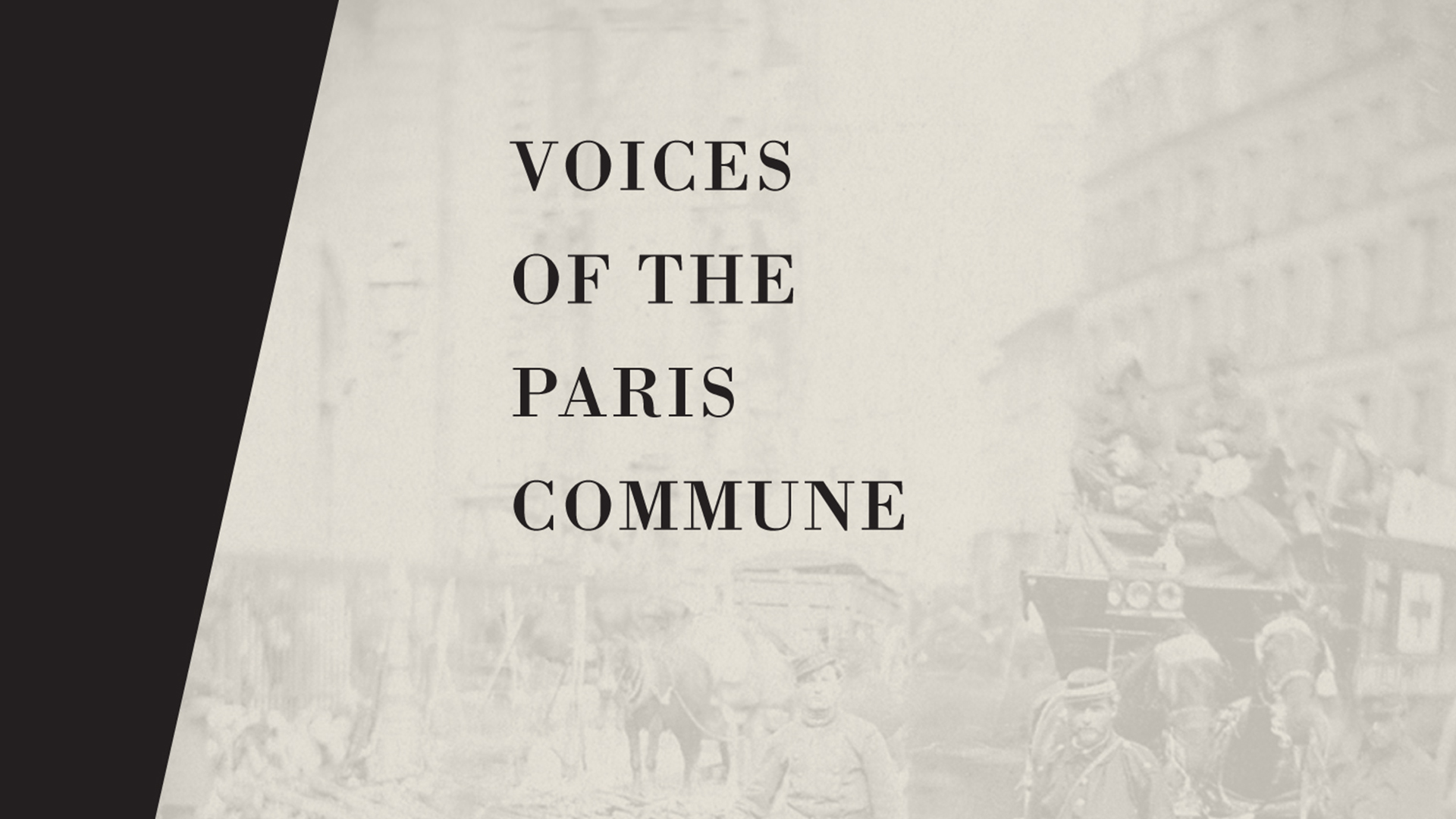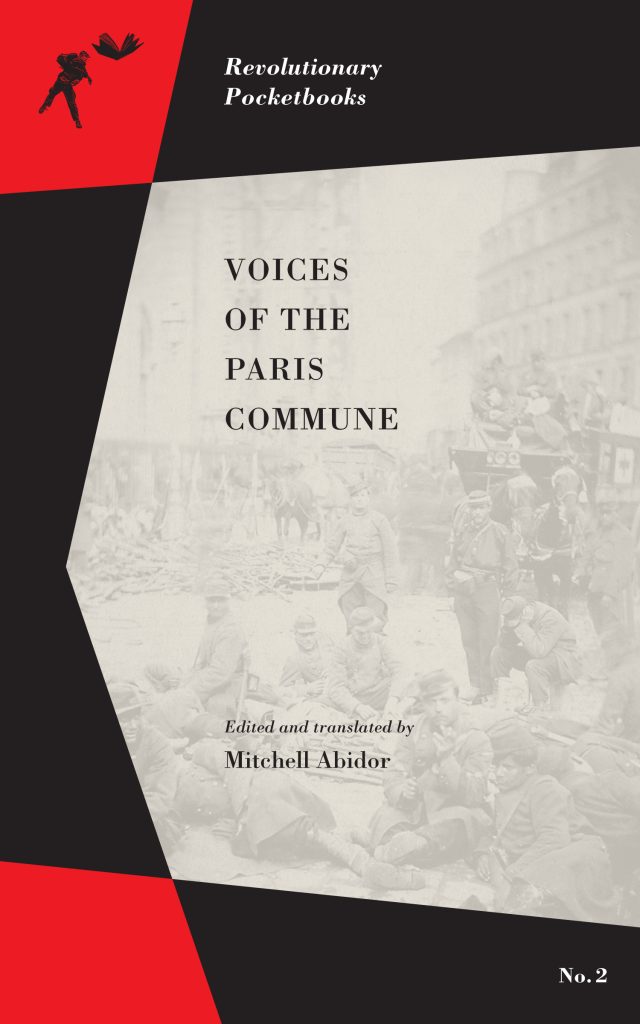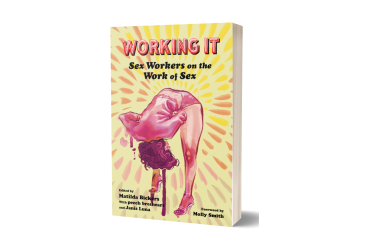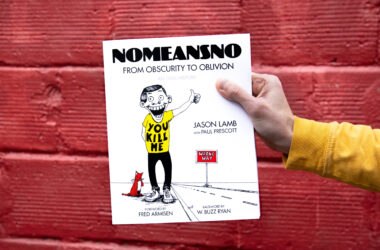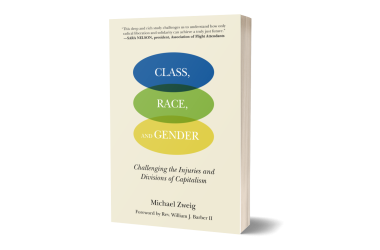By Corinna Cliff
Bookslut
January 2016
In
March 1871, after France lost the war against Prussia, the French
army was driven out of Paris, leaving the city in the control of the
National Guard and its citizens who formed the Commune, a
democratically elected council that held the power in the city for two
months before it was crushed by the French Army.
As a unique example of people standing up against the establishment and seizing the power, the Paris Commune continues to be a point of reference for leftist movements, especially anarchists and Marxists.
At the same time it is also one of the saddest and most violent stories in French history, with thousands of civilians killed during the “Bloody Week” when the French army entered the city. Louise Michel, one of the “voices of the Commune,” described it as “an immense abattoir where after eight days of slaughter, the hordes of flies over the mass graves put an end to the killings for they feared the plague.”
In Voices of the Paris Commune, Mitchell Abidor assembled accounts of people who, in one way or another, took part in the Commune. The largest part of the book is composed of responses to a call for papers issued by the journal La Revue Blanche in 1897, asking participants to write about their role in the Commune and to share their views on it. Abidor dedicated the first part of the book to articles by journalist Jules Vallès written during the Commune, followed by scripts from debates in the Commune.
Abidor translates historical texts for the Marxist Internet Archive, and has published the following books among others: A Socialist History of the French Revolution by Jean Jaurès; Anarchists Never Surrenderby Victor Serge; Death to Bourgeois Society, a collection of writing by and about the anarchist propagandists of the deed; Communards: The Paris Commune of 1871 as Told by Those Who Fought for It; and Emmanuel Bove’s novella A Raskolnikoff.
This is your second book about the Paris Commune. What interests you about the Paris Commune? Why do you want people to listen to the voices from the Commune?
Though I’ve translated documents from all phases of left-wing activity in France, from Jean Meslier, the first great atheist — who incidentally was a priest — to the Maoist movement in the period after May ’68, it’s the French Revolution, the Commune and the individualist anarchists of the early twentieth century I love the most. With the Commune it’s got to do with how remarkable it was that the people of Paris were actually able to establish their own government, one that functioned under constant bombardment and attack, and that they were able to maintain a democracy throughout it all, though it was, to be honest, slightly curtailed in its final days. But to see a marginalized people, the workers, and political opponent of the empire of Napoleon III, people who had been imprisoned and exiled just months before, be able to stand on their own is an impressive sight. But I also think that the Commune can serve as an example for us today. Not that the workers of New York are going to follow the Parisians and rise up and seize power, but as an alternative form of radical left, what the French philosopher Michel Onfray calls la gauche communarde, the Communard left. A left that doesn’t follow behind infallible leaders, that has no canonic texts, and that preserves democracy. It’s about time the Commune was restored to its true place in history.
La gauche communarde — Is it just a term from Onfray, or is this a way many French leftists see themselves?
It’s a term I’ve only heard from Onfray, but it certainly explains a current, one that needs to spread all over the world. With the death of the old structures of the left there needs to be some principle all can stand behind, and I really can’t think of a better one than the notion of a Communard left, inspired by a whole city that stood up for the rights of the people while ensuring that all voices are freely heard.
You said that the book received more attention than you expected. Do you have ideas why there is a lot of interest in the Commune at the moment?
I think a lot of it has to do with the Occupy movement, which sparked an interest in movements that sprung up spontaneously to challenge those in power. If you look at it, there are two books other than mine that came out in 2015, Communal Luxury by Kristin Ross and Massacre by John Merriman, and given the timeline in publishing it seems safe to say that Occupy played a role in their gestation. In fact, Ross in her book talks about how the existence of the Occupy encampments led her to go back and examine the questions raised by the Commune. She goes no further than saying they share “resonances,” but whenever I speak about the Commune, people try to tie them much more closely together. This, I think, is the falsest of false connections and I oppose it adamantly: the Commune was a real government, voted for by real voters in a real election with real departments that really managed a real city. Occupy brought the issue of income inequality to the forefront, but in the end it was more a moral than a practical movement, and doesn’t deserve to share the same page as the Commune.
In your introduction you say that the best accounts of the Commune are fictional. Why is that? What makes writing historical accounts about it difficult? Has it to do with the Commune never having been able to fully develop its potential, which might make it more suitable for fiction?
The main historical account, that of P.O. Lissagaray, who was a participant, is one I never was able to warm up to. By the way, it was translated into English by Eleanor Marx, Karl’s daughter. Perhaps the failing is in me. But the fictional accounts I chose, Jules Vallès’s L’Insurgé and Jean Vautrin’s The Cry of the People[Le Cri du peuple in original, trans. as The Voice of the People — Ed.], are very particular kinds of fiction. Vallès was a member of the Commune and edited the most important of the Commune’s newspapers, Le Cri du peuple: The Cry of the People. His novel, the third volume of a trilogy covering his childhood, his adolescence, and the Commune, is less a novel than a first person account of the events, but a first-person account by one of the great writers. Vautrin is a novelist of the left, and his book takes a cast of mainly working-class characters through the life of the Commune. He’s clearly studied the writings of the time at great length, and the combination of this and his political sympathies makes The [Voice] of the People an exciting book.
Some of the problem with historical accounts is that the short life of the Commune, only 72 days, prevented it from doing all it would have, which is expressly why John Merriman’s excellent Massacre concentrates mostly on the eradication of the Commune, the defeats that led to 20,000 dead. But what disappoints me in historical accounts is that writers come into them with their preconceived notions and don’t let the Commune speak for itself. It’s presented as anarchist, as a forerunner of Bolshevism, as a precursor of Occupy, and I find all of that simply wrong. My preference, in this and all my other books, is to simply let the participants explain their actions and then let the reader decide. I have my opinion, but I might very well not be right. So let the reader see what those who were there had to say.
How did you choose the texts you included in the book? Which were your criteria?
In my first book on the Commune, Communards, I chose memoirs by people from all ranges of political opinion within the Commune, which was really varied. There were neo-Jacobins, followers of the great August Blanqui, and members of the First International. Voices of the Paris Commune was meant as a kind of primer using first person accounts, so I chose a representative figure like Vallès, and to show that the Commune was a real government there’s the minutes of a stormy discussion there in its final days about the execution of the hostages and the establishing of a Committee of Public Safety. But the heart of the book is a large selection of responses to questions about the Commune posed to Communards by the literary magazine La Revue Blanche in 1897. I wanted to show just how wide the diversity of opinion was among those who fought for it, answers to questions like “Could it have won?” and “What were its failings?” For us, nearly a century and a half later, this is an event that’s all of a piece; for those who were there it was anything but that, and I thought it important to show how lively the debates were during its life and after its death.
How was it to translate political texts from two-and-a-half centuries ago? The English versions are all very accessible. Did you have to make difficult choices?
This is what I do, how I’ve chosen to spend my time, translating revolutionary texts from the mid-seventeenth century to the period after May ’68 in France, as well as from particular movements in Argentina, Italy, Portugal, and the world of Esperanto. A friend in London made me my business card with my name and profession: “Militant Translator.”
The only difficulty with the texts in Voices of the Paris Commune was limiting them. The selections from the discussion in La Revue Blanche, with the Communards looking back a quarter of a century later on the events, is just a fraction of the full discussion, and I wish I could have done the whole thing. In fact, it’s inspired me to do a similar investigation of May ’68 in France, which will be published in 2018, the fiftieth anniversary of the events.
Do you have a favorite character from the Commune?
Jules Vallès stands out for me as someone who was both revolutionary and a firm defender of democracy, insisting on the freedom of the press until the final day. But there are individual stories that particularly touch me. The saddest is probably that of the death of the elder of the Commune, Charles Delescluze. The Commune was the culmination of a lifetime of his political activity, and in its final days he walked to the Commune’s outer barricades so he could examine the situation. While he was there, he was mocked by the National Guard, as if he was seeking to flee and leave the workers to die. He was devastated, and went back to his office. He sat there for a while, signed some orders, then stood up and left and, not saying a word to anyone, walked directly into enemy fire to be killed. If there was a more noble death in the history of the revolutionary movement I don’t know what it was.
The political backgrounds of the Communards were quite diverse — there were anarchists, Marxists, republicans. Was there a social vision for a state that was shared by all?
Anarchists were few, the movement not yet having really gained hold in France, aside from Proudhonians. Marxists, too, were pretty rare. Such as they were they were members of the First International and their faction within the Commune was called the Minority. They, in fact, fought against the majority, who were followers of Blanqui and various forms of neo-Jacobins, when the majority wanted to become more dictatorial and set up a Committee of Public Safety. They even threatened to stop attending sessions of the Commune, but in the end they did.
But let me get back to the social vision of all the groups: every one of them wanted a republic, but a social republic, one that ensured a decent life and living for all, that wanted everyone — well, every male, but who knows, with time they might have added women — to have equal political rights and the ability to express their opinions, and wanted to remove any official involvement in religion. The Commune burned the guillotine, banned night work for bakers, suspended rent payments, freed goods held in the national pawn shop, did away with the standing army… It didn’t have the time to implement specifically socialist measures, but they would have, since every current within it believed in equality and social justice. When elections were held for the Commune they happened throughout Paris even in the bourgeois quarters, and those elected from those areas chose not to sit, leaving the Commune unified at least on a general vision of society, though not on some of the specifics.
What is your stance on the fight between the minority and the majority in the Commune?
Though I understand the impulse behind the majority’s drive to ensure the Commune’s survival through the same measures the French Revolution had implemented, my sympathies are all with the minority. The majority was a prisoner of the schemas of 1792, the minority were admirers of the great Revolution, but feared falling into the mistakes that tarnished its image and caused it great harm.
Do you think the Commune had a chance at survival at all?
No, and as some of the veterans of the Commune who are in my book say, few of them did. This was a war between Paris and rural France — indeed, the rest of France — and even had the forces in Versailles led by Thiers not crushed the Commune, the Prussians would have stepped in and finished the job. This makes the Commune even more impressive: that they stood by their ideas and attempted all they did as the bombs were falling on their heads, while they were dead men on reprieve.
Women had no voting rights and very little opportunity to contribute to its politics. They were able to join the National Guard though, and many of the texts in the book mention women fighting on the barricades. I find it strange that women were accepted as soldiers in the army when they weren’t even allowed to vote. I was wondering why there were many women who were so passionate about the Commune that they were ready to die for it even though they were excluded from all decision making.
Let’s be clear: women fought but not as formal members of the National Guard, which was all male. They went to the barricades just as did so many workers out of uniform: to defend a government that was theirs, that granted even unmarried women the rights to benefits owed to their fallen male companions. Women established their own organizations, which were encouraged and supported by the Commune, and several of them, most importantly Louise Michel and Elisabeth Dmitrieff became emblematic figures. But women were also used as a negative symbol of the Commune, as the pétroleuses, the women who supposedly spread gas around the city and set it alight. The city burned, both as a result of being bombarded and also because it was consciously set on fire, though not by brigades of gas-wielding women. Putting the blame for this entirely on women was another way to demonize the Commune for unleashing a horde of savage Amazons, for upsetting the gender cart.
About women in the National Guard: That must be false information that got copy-pasted over the Internet, then, because I found it in more than one article.
They fought, but weren’t formally in the National Guard. They served more as support staff and nurses, courageously so, doing it at the front lines, and dying courageously as well. I don’t want to downplay the role of women, and the brave way they took up their roles can’t be stressed strongly enough, but I think we have to stick with the historical truth and not make the Commune what it wasn’t. But don’t kick yourself over false information: it’s all over the place, on the right and the left. This is why I think it’s so important to read the original sources, and for me to make them available in English.
When I give talks about the Commune I usually start by saying that the Commune is a blank screen that every element of the left projects its refereed image onto. Let me give you a perfect example of how much wishful thinking goes into examining the Commune. Recently I was interviewed by an anarchist, who insisted that the Commune was more anarchist than not, and he gave as proof the fact that National Guard officers were elected, like in the anarchist armies of Spain during the Civil War. I read him an account of the election to a National Guard unit, of how workers were elected to leading positions (though quickly replaced by experienced soldiers), but then told him when the election took place: September 1870, five months before the Commune was even established! Elected officers were a National Guard thing, not a Commune thing, but if you look at what happened between March and May without looking at the context you can easily change the meaning of an act.
I was going to ask you about the pétroleuses. How did this rumor come to pass? Was it widely believed?
Not only was it widely believed, it’s a notion that still has to be debunked today, though scholars have pretty much proved it false. After all, of the thousands of women put on trial after the crushing of the Commune, not a one was found guilty of setting any buildings on fire. That said, an official organization of Communard women did call for its members to stock up on rifles and petrol, but again, there’s no indication that groups of women then set out to burn buildings like the Hôtel de Ville down.
The legend of the pétroleuses is part of the generally dark legend that grew up around the Commune, as an event of unimaginable savagery unleashed by barely human workers. With the pétroleuses was added the element of misogyny, Communard women being depicted as unnatural, bestial women burning down the very city they lived in. Their burning down the city joined the killing of the hostages — around sixty victims — as the image of the Commune in the public’s eye, or at least the image the bourgeois press and writers projected. 20,000 workers killed by the forces of order? Never heard of it. Or they deserved it.
In which ways can the Commune serve as an example today?
In a direct sense, it’s hard to say. It certainly isn’t in the cards that the workers of any of the great cities of the world will be taking over their cities and running them as independent governments. It’s really far more as an example of that alternative left I mentioned, one that doesn’t fall into silly sectarianism that discounts people with differing views or who fail to follow a line laid out by Lenin in 1905 or Trotsky in 1936. And it’s also one that responds to a country’s own reality, not falling back on the dicta of long-dead authorities.
Are there social movements at the moment that carry the spirit of the Commune, or that you find otherwise inspiring?
I would say that Podemos in Spain, with its vision of a pluralist left and a more democratic country contains much of the spirit of the Commune. They reject social democracy, but also reject turning their backs on the daily reality, the quotidian sufferings of the people of Spain in the name of some kind of intellectual or doctrinal purity. The free debate within Podemos, its ability to take in all progressive points of view, is in the direct line of the Commune.
Why did you choose to end the book with a letter by General de Gallifet who says nothing but that he is unable to answer the questions about his role in the Commune and his opinions on it?
Gallifet was the man who completed the crushing of the Commune. I thought it was a dramatic way to close the discussion. Maybe I should have made that clearer. Maybe in a second edition…

